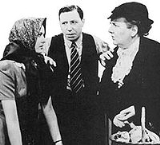
Turned Out Nice Again
Encyclopedia
Turned Out Nice Again is a British
comedy
film starring Lancashire
-born George Formby. The film was released in 1941
and filmed at Ealing Studios
, London
.
comedy sequence, highlighting Formby's knockabout credentials. The film quickly develops into a cleverly constructed and well written character comedy, with George Formby as a more competent, sensible figure than the gormless policeman of his previous film, Spare a Copper
(1940).
Ironically, Formby's song "Turned Out Nice Again" does not appear in this film at all.
United Kingdom
The United Kingdom of Great Britain and Northern IrelandIn the United Kingdom and Dependencies, other languages have been officially recognised as legitimate autochthonous languages under the European Charter for Regional or Minority Languages...
comedy
Comedy
Comedy , as a popular meaning, is any humorous discourse or work generally intended to amuse by creating laughter, especially in television, film, and stand-up comedy. This must be carefully distinguished from its academic definition, namely the comic theatre, whose Western origins are found in...
film starring Lancashire
Lancashire
Lancashire is a non-metropolitan county of historic origin in the North West of England. It takes its name from the city of Lancaster, and is sometimes known as the County of Lancaster. Although Lancaster is still considered to be the county town, Lancashire County Council is based in Preston...
-born George Formby. The film was released in 1941
1941 in film
The year 1941 in film involved some significant events.-Events:Citizen Kane, consistently rated as one of the greatest films of all time, was released in 1941.-Top grossing films :-Academy Awards:...
and filmed at Ealing Studios
Ealing Studios
Ealing Studios is a television and film production company and facilities provider at Ealing Green in West London. Will Barker bought the White Lodge on Ealing Green in 1902 as a base for film making, and films have been made on the site ever since...
, London
London
London is the capital city of :England and the :United Kingdom, the largest metropolitan area in the United Kingdom, and the largest urban zone in the European Union by most measures. Located on the River Thames, London has been a major settlement for two millennia, its history going back to its...
.
Sypnosis
Turned Out Nice Again begins with a slapstickSlapstick
Slapstick is a type of comedy involving exaggerated violence and activities which may exceed the boundaries of common sense.- Origins :The phrase comes from the batacchio or bataccio — called the 'slap stick' in English — a club-like object composed of two wooden slats used in Commedia dell'arte...
comedy sequence, highlighting Formby's knockabout credentials. The film quickly develops into a cleverly constructed and well written character comedy, with George Formby as a more competent, sensible figure than the gormless policeman of his previous film, Spare a Copper
Spare a Copper
Spare a Copper is a 1940 British, black-and-white, musical comedy war film, directed by John Paddy Carstairs and starring Ronald Shiner, as the Piano Mover and Tuner, and George Formby. It was produced by Associated Talking Pictures...
(1940).
Plot
George Pearson, an employee at an underwear factory, is caught between his modern wife and his meddling mother. After buying a special yarn and getting his wife to promote it, he has an argument with his boss, Mr Dawson who insults Pearson's wife and refuses to apologise. Peasron then resigns. After finding out that the yarn is actually worth a fair amount, Mr Dawson tries to buy it from Pearson but he has some competition.Songs
The songs performs by George Formby in the film are as follows: -- Auntie Maggies Remedy (Formby/Latta)
- You Can't Go Wrong In These (MacDougal)
- The Emperor Of Lancashire (MacDougal)
- You're Everything To Me (MacDougal)
Ironically, Formby's song "Turned Out Nice Again" does not appear in this film at all.
Cast list
- George Formby as George Pearson
- Peggy BryanPeggy BryanMargaret Eileen "Peggy" Bryan was an English film and stage actress, born in Birmingham, England. She appeared in many films, including most notably as the screen wife of George Formby in the comedy film Turned Out Nice Again...
as Lydia Pearson - Edward ChapmanEdward Chapman (actor)Edward Chapman was an English actor who starred in many films and television programmes, but is chiefly remembered as "Mr. Wilfred Grimsdale", the officious superior and comic foil to Norman Wisdom's character of Pitkin in many of his films from the late 1950s and 1960s.Chapman was born in...
as Uncle Arnold - Elliott Mason as Mrs Pearson
- Mackenzie Ward as Gerald Dawson
- O. B. Clarence as Mr Dawson
- Ronald WardRonald WardRonald Ward was a British actor who appeared in more than twenty British films between 1931 and 1956. He was born in Eastbourne in 1901 as Ronald William Ward, and made his screen debut in the 1931 film Alibi...
as Nelson - John SalewJohn Salew-Selected filmography:* The Silent Battle * Sailors Don't Care * Once a Crook * One of Our Aircraft Is Missing * The Day Will Dawn * Secret Mission * It Always Rains on Sunday...
as Largon - Wilfrid Hyde-WhiteWilfrid Hyde-WhiteWilfrid Hyde-White was an English character actor.-Early life and career:Wilfrid Hyde White was born at the rectory in Bourton-on-the-Water in Gloucestershire, the son of William Edward White, canon of Gloucester Cathedral, and his wife, Ethel Adelaide Drought...
as Removal man - Hay PetrieHay PetrieHay Petrie , born David Hay Petrie, was a Scottish actor noted for playing eccentric characters, among them Quilp in The Old Curiosity Shop , the McLaggen in The Ghost Goes West and Uncle Pumblechook in Great Expectations .Hay Petrie went to St Andrew’s Academy, Dundee, and St...
as Drunk - Michael RennieMichael RennieMichael Rennie was an English film, television, and stage actor, perhaps best known for his starring role as the space visitor Klaatu in the 1951 classic science fiction film The Day the Earth Stood Still. However, he appeared in over 50 other films since 1936, many with Jean Simmons and other...
as Diner

